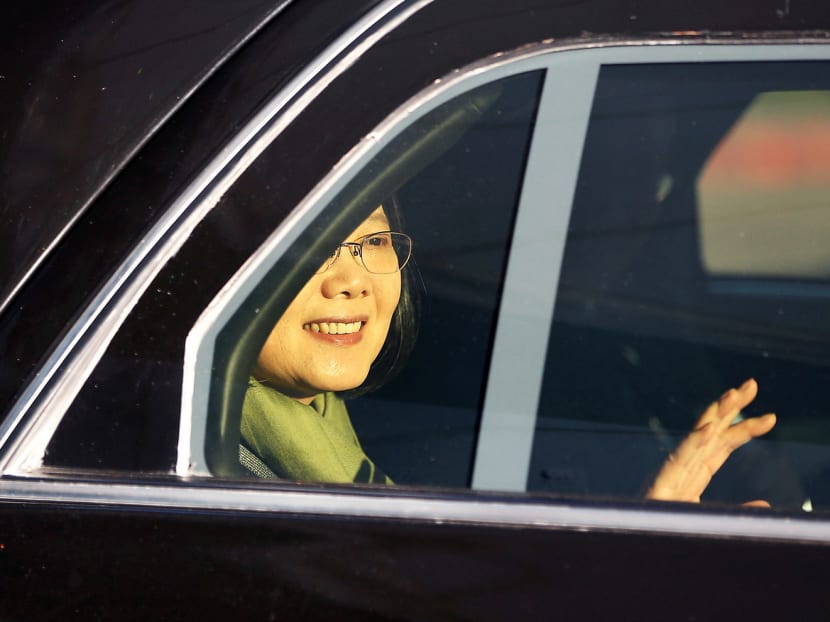Tsai firms up ties in Central America, amid pressure from China
MEXICO CITY — Taiwan President Tsai Ing-wen has been hopscotching across Central America this week, attending the inauguration of Nicaragua’s President Daniel Ortega, touring Guatemala’s colonial city of Antigua and visiting the shrine of Honduras’ patron saint.

Taiwan President Tsai Ing-wen smiles as she leaves a meeting at Twitter during a stop-over after her visit to Latin America in Burlingame, California, on Saturday. Taiwan has diplomatic relations with only 20 countries. Most of these are in Latin America and the Caribbean. Photo: Reuters
MEXICO CITY — Taiwan President Tsai Ing-wen has been hopscotching across Central America this week, attending the inauguration of Nicaragua’s President Daniel Ortega, touring Guatemala’s colonial city of Antigua and visiting the shrine of Honduras’ patron saint.
From a global perspective, it is the sort of tour that looks like a diplomatic asterisk. But there is nothing trivial about it for Ms Tsai, who is in Central America to shore up relationships amid increasing pressure from China.
Taiwan, which China considers a breakaway province, has diplomatic relations with only 20 countries, the largest cluster of those is in Latin America and the Caribbean. These relationships, complete with embassies, trade agreements and foreign aid, strengthen Taiwan’s effective sovereignty.
That is particularly important now for Taiwan, which fears becoming a casualty as United States President-elect Donald Trump threatens to roil the China-America relationship. Mr Trump accepted a congratulatory phone call from Ms Tsai after his election, a break from protocol that prompted angry responses from China.
Maintaining the few formal relationships Taiwan has is an important source of domestic legitimacy for its leaders. If Taiwan is “not recognised by any country in the world — what good are you?” said Mr Richard Bush, director of the Center for East Asia Policy Studies at the Brookings Institution in Washington.
China has worked for decades to isolate Taiwan. Under the “One China” policy, Beijing demands that countries with which it has diplomatic relations drop their recognition of Taiwan. Since the US established formal ties with China in 1979, most of the world has followed suit. Central America is an outlier. In a quirk of diplomacy, all the countries of the region except Costa Rica still recognise Taiwan.
China poached Taiwan’s friendships for years, but it stopped while Ms Tsai’s predecessor Ma Ying-jeou, who advocated closer ties to China, was in office. New leaders in Panama, Paraguay and El Salvador all explored a switch, but China held them at bay.
“China can turn the screw whenever it wants,” said Assistant Professor Colin Alexander, an expert on political communications at Nottingham Trent University.
Since taking office in May, Ms Tsai has been careful to cultivate its friendships. And the trip this week to four Central American allies is intended to keep them in the fold.
“The best outcome (of the trip) is that nothing happens,” said Mr Bush.
There is a darker side to the relationships, too, going back to the Cold War. In the 1970s, Taiwan trained Guatemalan and Salvadoran military officers involved in rights violations in brutal civil wars.
Taiwan has since ended its “cheque-book diplomacy”, in a tacit acknowledgment that it could never outspend China.
That has been clear in the Caribbean, where China has invested in expensive projects, sometimes in exchange for switching diplomatic recognition from Taiwan.
Indeed, the other Central American countries have found that they can attract Chinese investment without normalising diplomatic relations. They maintain informal business contacts.
“It’s all a kind of smoke and mirrors,” said Asst Prof Alexander. “The Central American republics have it pretty good. Taiwan treats them like a princess, and China is engaged in smart power and flexible diplomacy where it’s still willing to invest.”
China’s most grandiose investment in the region is a Chinese tycoon’s US$50 billion (S$71 billion) plan to build a canal across Nicaragua.
In Honduras, a Chinese company is building a dam on the Patuca River with funding from Chinese banks.
“As long as there is a fluid relationship between Taiwan and China, it’s a game they can continue to play,” said Prof Enrique Dussel Peters, a China expert at the National Autonomous University of Mexico.
But turbulence in that relationship could change the dynamic.
“There have been discussions in each of these countries about whether it makes sense to continue the relationship with Taiwan,” added Prof Peters. THE NEW YORK TIMES






